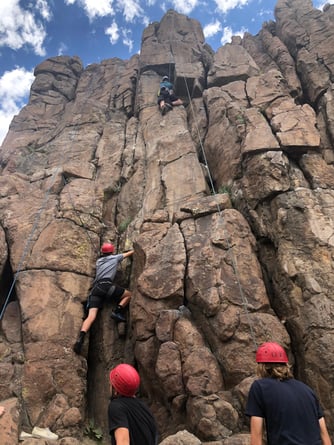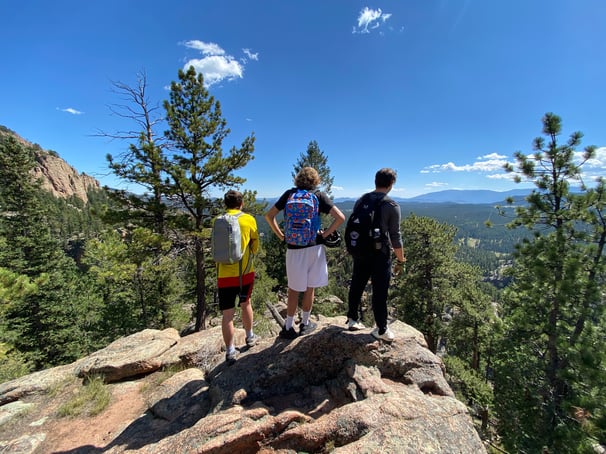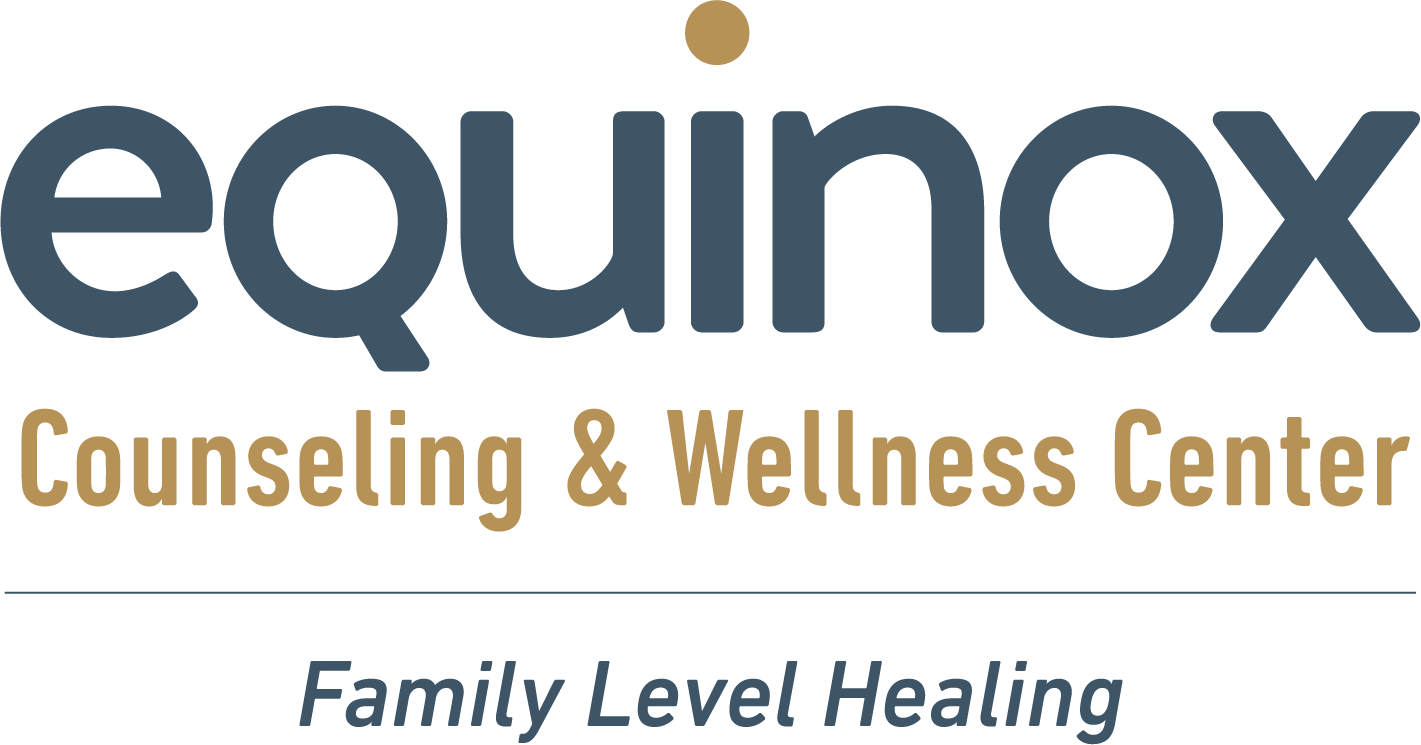Equinox Counseling & Wellness Center incorporates the use of expert-led wilderness therapy intensives that are action and adventure oriented as a necessary complement to traditional therapies for clients. Equinox clients are youth ages 10 to 18, and young adults ages 19-28 with issues related to anxiety, depression, suicidality, and mood disorders in combination with Autism Spectrum Disorder, ADD/ADHD, and Executive Function Disorder. Equinox’s philosophy is that the lasting results of wilderness therapy are much more likely to occur when youth remain connected with their families, support systems, schools, and social environments. Subsequently, Equinox wilderness experientials are intentionally, purposefully shorter in length--usually 2-3 days, and are scheduled with a frequency that supports longer-term therapeutic goals/treatment plans while being part of the client’s involvement with Equinox.
Equinox believes the use of expert-led action and adventure activities is a necessary complement to traditional therapies and is often a critical component in helping those with complex emotional, behavioral and psychological challenges. This may include youth and young adults with issues related to anxiety, depression, suicidality, and mood disorders in combination with Autism Spectrum Disorder, ADD/ADHD, and Executive Function Disorder. Outdoor behavioral activities such as peak ascents, white water rafting, fly-fishing, rock climbing or mountain biking helps these individuals gain valuable skills and insights they can utilize in the world around them. Research has proven:
- Teens with neurodiversities develop improved social and emotional skills more quickly through group activities such as setting a tent or preparing meals, than in traditional therapy settings.
- Young people who entered an outdoor behavioral program with anxiety or depression left with fewer symptoms and were able to maintain a positive outlook six months later.
- One study followed teens 2-3 years after participating in an outdoor behavioral program and found 83% reported doing better.
The benefit of wilderness and adventure therapy for youth with executive function challenges is that it provides action-based learning and challenging experiences to practice concepts that complement what is being learned in individual or family therapy. Because Equinox offers Wilderness Therapy as a supportive versus the sole element of the therapeutic process, we recommend this intervention at very specific junctures of a child’s treatment. Equinox wilderness experientials are intentional, purposefully shorter in length, and scheduled with a frequency that supports the longer-term therapy treatment goals. Weekend or multi-day programs are specifically developed to address therapeutic needs as part one part of a larger treatment plan. One that not only includes outdoor and adventure-based environments, but also milieu therapy, expressive arts, somatic work, and nutrition alongside family and individual counseling.

Recent Criticism of Wilderness
Programming
The troubled-teen industry has recently
come under scrutiny for programs failing
to have staff that are fully aware of a
child’s diagnosis and treatment plan,
field staff who are not trained or credentialed for various outdoor adventure activities, as well as safety and risk concerns from parents who are placing their children in these programs. Most wilderness therapy programs are designed to occur over several weeks or months in remote wilderness environment with little to no interaction with family and local communities. While this approach may be beneficial for some, Equinox believes that lasting results of wilderness therapy are much more likely to occur when youth remain connected with their families, support systems, schools, and social environments.
Skillfully Trained Staff
As part of the overall treatment requirements at Equinox, staff members are thoroughly trained. All Equinox clinical staff hold a minimum of current first aid and CPR training. Lead field staff hold a minimum of current Wilderness First Responder (WFR) certification and are present on all backcountry outings. In addition to these credentials, all staff receive in-depth training on internal emergency medical protocols. All field staff complete 10 days of formal training during their first year on the team. Each year thereafter, each staff completes three to five days of refresher or higher-level training.
Staff who lead technical climbing, ropes courses, and winter backcountry experiences have completed rigorous professional training in their disciplines, and many hold credentials from certifying organizations. Some of those organizations include: the American Mountain Guide Association (AMGA), the Professional Climbing Guides Institute (PCGI), the Association for Challenge Course Technology (ACCT), the Wilderness Medicine Institute (WMI), the American Avalanche Institute (AAI) and the American Institute for Avalanche Research and Education (AIARE).

Equinox places the highest emphasis on physical and emotional safety and uses “client choice” at the foundation of every experience with our clients. There is inherent value in being in nature and utilizing clinically founded, and thoughtfully guided experiences to safely help clients develop new insights and practical tools for healthy living. Our field and clinical teams take safety very seriously. We don’t do anything with our clients that we wouldn't do with our own children.
Risk Management
Equinox Counseling and Wellness Center has developed pre- and post-course processes to insure a high level of excellence and risk management for client experiences. Prior to any intensive, the treatment team completes a pre-course process which includes matching the client’s therapy goals to the appropriate activity, staffing for experience, choosing the specific activity site and reviewing site specific protocols. We then address risk management, gear selection, dates and times, weather forecast, and activity sequence leading up to the experience. After each adventure or wilderness experience, the treatment team completes a post-course review and summary of how goals were met, the client’s experience, highlights of the trip, incidents and what could be improved in the future—and most importantly, how the treatment team activates on specific strategies in their everyday work with youth to ensure optimal transition and practice of skills once back in their community and home setting.
Bringing the Wilderness Therapy Experience Home
“It’s worth working through the discomfort and pain to get to the sweet stuff.”
~17-year-old client’s insight after hiking uphill to ski fresh powder on a
Therapeutic Wilderness Intensive
Youth that are away for 30 days to three months can speak to their successes— learning many new skills from the wilderness program, finding a sense of self-confidence, and trusting their ability to count on peers and leaders. However, to successfully bring a child back into the home and school environment, families need guidance and support to ensure a successful transition process. Often this is overlooked, under-planned, or just not adequate to bring the significant learning that occurred in the wilderness back to everyday relationships and interactions. By utilizing this shorter more purposeful approach to wilderness therapy, the transitions are less disruptive, include your significant family members, and are part of a well-planned and purposeful treatment process.
 The benefit of adventure therapy for youth
The benefit of adventure therapy for youth
with executive function challenges is
that it provides action-based learning and
challenging experiences to practice
concepts that complement what is being
learned in individual or family therapy.
Because Equinox offers Wilderness
Therapy as a supportive
versus the sole element of the therapeutic process, we recommend this intervention at very specific junctures of a child’s treatment versus taking a “one experience fits all” approach.
While some programs try to fit a square peg in a round hole, we are truly client centered. We choose the adventure activities and wilderness settings based on the unique needs of each adolescent or teenager. Wilderness and Adventure Therapy experience can be meaningful to treatment needs, create opportunity for growth and learning, and provide a balance of challenge and fun.










